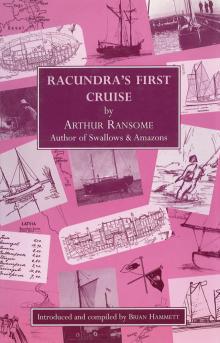- Home
- Arthur Ransome
Peter Duck: A Treasure Hunt in the Caribbees Page 8
Peter Duck: A Treasure Hunt in the Caribbees Read online
Page 8
Susan was farthest on with her dressing, and did not seem to mind the motion. She just leant back against the bunks and went on brushing her hair. Titty slipped sideways. The floor of the cabin sloped uphill. Titty seized some clothes and a pair of canvas shoes. “I’m going to finish my dressing on deck,” she said hurriedly, climbed up the slope of the floor, got out of the door and stumbled up the companion-way.
Nancy, in the cabin of the Amazons, said nothing. She just looked at Peggy. A queer expression came into her eyes, as if she were looking not so much at Peggy as through her. She picked her shoes up out of the muddle on the floor, then dropped one of them, tried to catch it, slipped, recovered herself, made up her mind she would get that shoe later, and almost fell out of the cabin door and round on the stairway of the companion. She felt better as soon as her head was above deck. This would never do, she thought. She must have been mistaken in thinking she felt so bad. She put on the shoe she had with her, took two or three good sniffs at the wind and then went back after the shoe she had left. She found Susan and Peggy side by side on the bottom step of the companion-way, putting on their own shoes with difficulty and laughter, but talking quite happily of cooking on the swinging stove because the other would be on too much of a slant. It was bad enough having to step over them. But she did it, worked herself round into her cabin, found her shoe and came out again, grabbing at the saloon table to steady herself. “Hullo, Nancy!” said Peggy. “Isn’t this jolly?” But Nancy did not answer. She had meant to get her shoe, and she had got it, but this talking would have been too much. She got across the saloon, and through into the fo’c’sle, to get her head up through the fo’c’sle hatch into the fresh hard air. For once, Nancy, the Terror of the Seas, did not feel at all like a captain. She hardly felt it would be safe to say, “Shiver my timbers!” Her timbers felt a bit shivery already. And the funny thing was that Peggy, who was afraid of thunder and things like that, seemed not to be bothered at all by the unusual motion.
On deck things settled down quickly. Old Peter Duck was moving here and there, seeing that everything was as it should be. Coiled halyards that had shown signs of straying had been recoiled and stowed in places where they were willing to stay. The anchor had been brought inboard and secured in its place. He was busy now lashing down the little rowing dinghy. The fenders that had been used to protect the new green paint of the Wild Cat from the dirty quays of Lowestoft were all inboard, each in its place, ready for next time it would be needed, but not one of them left hanging over the side to make good sailors laugh. Peter Duck, busy about this and that, seemed happy to have his feet once more on a slanting deck, lifting and swaying along at sea, after so many years on the level deck of his old wherry moving steadily along smooth inland waters.
And the land was slipping by. The Wild Cat was off at last and making the most of the good north-easter, running down inside the shoals, past Claremont Pier, and the hospital and Kirkley Church. Pakefield Church was abeam. Out to sea a coasting steamer was hurrying south, from Newcastle or Grimsby or Hull, hurrying, but not moving as fast as her own smoke which was blowing before her in a long low dirty cloud. Fishing ketches were leaving the harbour, and some of the trawlers, and far away on the horizon there were two or three little plumes of smoke, showing where there were steamers so far away as not to be in sight. One by one the rest of the crew climbed up on deck, hung on to anything that came handy and looked about them. The trial trip had been in smooth water compared with this. Now they were off at last and learning what it was like to be at sea. Today there was a real wind. The land seemed to sway up and down as they rushed along. Sometimes the Wild Cat would lift to an even keel as a sea passed under her, and then the land would drop to the bulwarks. Then over she would go again, and the land seemed to leap up the sky, and in the place where it had been a moment before there would be the grey water sweeping along by the lee rail.
Presently Captain Flint called John to the wheel.
“Take over, will you, while I deal with that Primus for them? Steer for that buoy. Black and white, with a cage on the top of it. Steer close by it, leaving it to port.”
John gulped, but said “Aye, aye, sir,” as stoutly as he could. A moment later he was feeling the ship, meeting her as she yawed, looking anxiously back at her rather waggly wake, and trying to do with a real ship at sea what he had learnt to do very well with the little Swallow on the lake in the North. But it was not easy in this hard wind and uncertain sea. There she was again, heading the wrong side of the buoy. Oh, bother it, and now too far the other way! And there was Nancy watching. This would never do. He must keep that piebald chequered buoy just showing on her port bow. Gradually the Wild Cat steadied down and John grew confident enough to look at Nancy who, he feared, had all this time been looking critically at him.
But Nancy was not thinking about him, or about the steering, or even about the Wild Cat. She had a queer staring look, as if she were trying to do some difficult sum in mental arithmetic. John could hardly believe that this was the same Nancy who was always so free with her “Hearties” and “Shiver my timbers!” and so ready to call other people tame galoots and to teach them all there was to be known about the sea.
“Come and look, Nancy,” called Peggy’s voice from inside the galley in the forward part of the deckhouse. Nancy pulled herself together, and clinging to the bulwarks worked herself along to the galley door. It opened.
“Come in, but shut the door quick. It’s too blowy from that side,” said Peggy. “Just look at the Primus, swinging in rings, like the compass, so that the kettle keeps steady whatever the ship’s doing.”
Nancy let go the bulwarks and fell against the deckhouse. She pulled the galley door open again and put her head in, but quickly drew it back. In the tiny galley there were Peggy, Susan and Captain Flint. Captain Flint had been showing them how to deal with the Primus, and he had used rather too little methylated spirit, besides pumping a little too soon, so that the Primus had smoked a bit. It was burning all right now, and the kettle was boiling and the galley was full of steam and the smell of paraffin. And there were Peggy and Susan in the middle of that smelly fog, cheerfully cracking eggs into a bowl and making coffee in an enormous coffee-pot.
Nancy shut the door quickly and dragged herself back to the bulwarks, throwing her head up to get all the wind on it she could. This was terrible. Everybody seemed to be all right except her. Right forward she could see Roger eagerly asking questions and Peter Duck as steady on the slanting deck as if he had grown there and had roots, explaining something about getting the anchor inboard. Was the sea always like this? She could hardly bear the thought of going below, and yet she desperately wanted something hot to drink. When at last she saw Peggy and Susan, shouting with laughter, dodge out of the galley door and round to the companion taking damp towels to lay on the saloon table, Nancy began to wish she was back at home.
The damp towels, of course, were spread on the saloon table to keep plates and things from slipping about, and a minute or two later the two cooks were carrying down a great mess of scrambled eggs and the coffee-pot and a big can of milk. Damp towels, however, were not enough, and Captain Flint went below to fit the fiddles to the table. Fiddles for tables aboard ship are wooden frameworks that divide up the table into small partitions so that if things slide they cannot slide far. “Feeding-boxes,” said Roger, “and one for each of us.” Then, when everything was ready, Peggy came up on deck to bang mercilessly on a big bell. Peter Duck came aft and took the wheel from John. John hurried down the companion to join the others. Roger had come down by way of the forehatch. Captain Flint was sitting in the arm-chair at the port end of the table. Nancy, feeling as if someone had hit her on the head with a club, somehow found her way to her place at his right hand. Breakfast began.
“Hullo, where’s Titty?” said Captain Flint.
Titty had been looking over the stern towards Lowestoft, watching to see if the Viper came out. It had been a hard job to hold the tele
scope steady. At last she had given up trying and had put the telescope back in its place in the deckhouse. That had been enough to make her quite sure she did not want to leave the deck again, even for breakfast. All she wanted was to stay still and breathe as much air as possible. Even the sunshine seemed to her to have turned a queer unpleasant colour.
NANCY AND TITTY SHARING THEIR MISERY
“What’s become of Titty?” said Captain Flint, between mouthfuls, down in the saloon.
“I’ll go and tell her,” said Nancy.
“I’ll go,” said John.
“I want to go,” said Nancy fiercely, and she staggered up off the bench and somehow got out of the saloon and up the companion. Captain Flint looked gravely after her but said nothing.
Nancy came out on deck and found Titty in the stern, still watching the sailing vessels come out of Lowestoft.
“Come down to breakfast, Titty,” said Nancy bravely, and then suddenly gave up. Titty, looking round, saw Captain Nancy struggle forward round the lee side of the deckhouse, grip the bulwarks and hang her head over the rail.
In a moment Titty joined her. If Nancy, the Captain of the Amazons, that notable timber shiverer, could be seasick, then anybody could be without shame, and for some minutes a captain and an able-seaman, sharing their misery, hung over the side together.
Peter Duck, his grey beard blowing in the wind round his weatherbeaten old face, an old stocking cap crammed down over his ears, gripped the spokes of the wheel, moved them this way and that, and, with his eyes looking far ahead, seemed to see nothing and to hear nothing that did not concern the steering of the ship. The whole crew of captains and mates and everybody else could have been seasick over the side without disturbing him in the least. But he did, now and then, look back at a group of sailing vessels leaving Lowestoft, that was already far astern.
Presently Captain Flint came up the companion with a mug of hot coffee in each hand. He found the sufferers and told them that some of the most famous of sailors were always sick at the beginning of a voyage in spite of spending most of their lives at sea. Nancy cheered up a little. Titty said she didn’t believe it would have been so bad if she hadn’t been looking the wrong way trying to see if the Viper was coming after them or not.
“And what about the Viper, Mr Duck?” asked Captain Flint, going aft to take the wheel and send Mr Duck down to breakfast.
“There’s several vessels come out,” said Mr Duck. “All in a bunch. It’d be hard to say if one of them’s the Viper. But if she isn’t out yet, she’ll be coming. You may lay to that, sir. Black Jake wouldn’t come in after us yesterday and not come out after us today. He ain’t going to lose sight of us, not if he can help it.”
“Oh, come, Mr Duck, these things don’t happen nowadays.”
“Black Jake’s his own law,” said Peter Duck. “He knows I’m aboard here, and if he’s got it in his head that I’m taking you to that place I told you of, he’d sail round the world after us.”
“Well,” said Captain Flint, “if one of those vessels is the Viper, and she’s after us, she’d have turned south by this time.”
“Look you there,” said Peter Duck, and Captain Flint snatched up the telescope from the rack inside the door.
One vessel had left the little group of sailing craft heading eastwards from Lowestoft. This vessel was now alone and heading south.
“Schooner,” said Captain Flint. “All lower sail set. Main topsail just going up. It’s our old neighbour.”
“I’d be surprised,” said Peter Duck, “if you was to say it wasn’t so.”
CHAPTER VIII
FIRST NIGHT AT SEA
ALL THAT DAY they sailed on with the north-east wind driving them southwards, past Walberswick, with its church tower and windmill, past Alde-burgh and Orfordness, and then from one lightship to another across the wide mouth of the Thames estuary. They passed the Shipwash lightship, with its ball at the mast-head, and the Long Sand, with its diamond, and then changed course a little so that they passed close by the Kentish Knock, which had a small ball on the top of a large one. They passed so near the Kentish Knock that they waved their hands to a man on the deck of the light-vessel and he waved his hand to them. Then they changed course again, steering a little west of south, for the Elbow buoy off the North Foreland. It was not a very clear day and for a long time they had been out of sight of land, and when they saw the North Foreland, with its steep chalk cliffs and the white lighthouse above them, they felt already like ancient mariners making a landfall after a long voyage.
They had had a fairly rough passage, too, but as the day wore on, Nancy and Titty had begun to feel better. The others had said nothing to them about their misfortune. None of the others had been seasick, but they could not be sure that they would not be, later on. Gradually, during the day, they had learnt how to keep their balance on the swaying deck of the little schooner. They had learnt the whereabouts of all the best things to which it was possible to hang on while moving about. Captain Flint had divided them into watches, too. He was taking the port watch, because in the saloon he sat in the arm-chair at the port end of the table and Peter Duck, who sat in the arm-chair at the starboard end, was to take the starboard watch. Lists were made by John and copied out on a sheet of paper pinned up inside the deckhouse:
Port Watch
Starboard Watch
CAPTAIN FLINT
MR DUCK
NANCY
JOHN
PEGGY
SUSAN
TITTY
ROGER
These lists looked all right, but Titty and Roger were not to keep regular watches, but to make themselves useful when wanted, and, as Captain Flint said, they couldn’t expect the mates to do the cooking and be on duty at the same time and half the night as well. But it was a good thing to have the list so that all knew their proper places.
“But aren’t we going to stop somewhere for the night?” asked Peggy.
“What for?” said Captain Flint.
“Sailing in the dark?”
“Why not? It’s a grand night and a fine wind, and we’re lucky to have it.”
It was just about Roger’s bedtime, and a late bedtime at that, when they had the North Foreland abeam. Roger wanted to be allowed to stay up, but Susan and Captain Flint would have none of it, though it was agreed that Roger should be waked if the engine was wanted during the night. Titty, too, was sent off to bed, but she did not mind because she had got well enough to have some Yarmouth bloater for supper (she had only sucked an orange for dinner, like Nancy, though the others were eating hot mutton chops) and she thought that if she lay down at once she might be able to keep herself from being sick. At dusk she took a last look round on deck, and a last look at the black schooner that had followed them down the coast all day, and then, determined to be better in the morning, hurried down below and was lying flat in her bunk just as soon as she had been able to get there. Susan and Peggy were allowed to stay up some time, partly on the excuse of doing a little washing up, but when they had had a good look at the rows and clusters of flickering lights that marked Broadstairs and Ramsgate, they too were urged to go below.
“I’d send the whole crew to bed,” said Captain Flint, “but four eyes are better than two, and we’ll be sailing through the Downs to the bottle-neck of the Channel, and there’ll be a lot of shipping. I’m taking the first watch tonight, and Mr Duck and John’ll be wise to get all the sleep they can now, for they’ll he on duty at midnight when Nancy and I’ll be going to our bunks. How are you, Nancy?”
“Quite all right,” said Nancy stoutly.
“Fine,” said Captain Flint. “Put an extra sweater on and keep the rest of this watch with me.”
The four of them went below, Susan and Peggy to settle down for the night, Nancy to get some warm things, and John to lie down after borrowing Susan’s alarm clock, setting it to go off at ten minutes to twelve and putting it under the pillow of his bunk.
Mr Duck had li
t the side lights some time before they were needed. He had gone forward to have a look at them, to see that they were still burning brightly, green to starboard, red to port, to show any other vessel she might meet in the darkness which way the Wild Cat was going. He was busy now making sure that the lamp inside the deckhouse should throw its clear light on the compass so that the steersman, from outside, could see it plainly through the little window. As soon as he was satisfied with that, he put his head out of the deckhouse door and looked aft, as Titty had, to see if the following schooner was still there. There were a good many lights about, and he did not stay to make sure.
“You’d better get your sleep, Mr Duck,” said Captain Flint. “You’ve only an hour or two.”
“Aye, aye, sir,” said the old seaman. He took his old head in again, laid him down on the starboard bunk in the deckhouse and began to snore, an easy, comfortable, mellow snoring, as soon as his head touched the rolled-up coat that he always liked better than a pillow.
Nancy came on deck with a scarf wound round her neck and an oilskin coat over her sweater.
“Hullo,” she said, as she came round the deckhouse to the wheel and heard that steady snore, “Mr Duck’s asleep.”
“Good man he is,” said Captain Flint. “That’s the way to do it. Waste no time in counting sheep but go to sleep as you hit the pillow and wake up ready for any job that offers. That’s the sailor’s way.”

 Peter Duck: A Treasure Hunt in the Caribbees
Peter Duck: A Treasure Hunt in the Caribbees Racundra's First Cruise
Racundra's First Cruise Great Northern?
Great Northern? Swallowdale
Swallowdale Swallows and Amazons
Swallows and Amazons Winter Holiday
Winter Holiday Missee Lee: The Swallows and Amazons in the China Seas
Missee Lee: The Swallows and Amazons in the China Seas Pigeon Post
Pigeon Post We Didn't Mean to Go to Sea
We Didn't Mean to Go to Sea The Firebird and Other Russian Fairy Tales
The Firebird and Other Russian Fairy Tales Coot Club
Coot Club The Big Six: A Novel
The Big Six: A Novel Six Weeks in Russia, 1919
Six Weeks in Russia, 1919 Secret Water
Secret Water The Big Six
The Big Six Missee Lee
Missee Lee Peter Duck
Peter Duck The Picts and the Martyrs
The Picts and the Martyrs